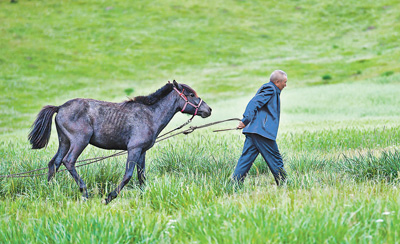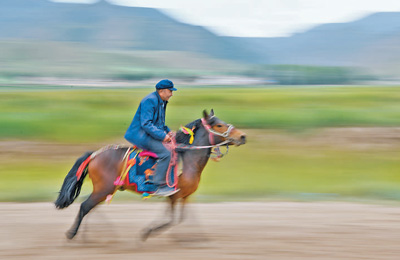“I have 60 or 70 horses now, and a good horse can be sold for 40,000 yuan ($5727),” says Li Huaizhi, 60, a resident of the village of Banwan in Tianzhu Tibetan Autonomous County, Northwest China’s Gansu Province.

Li leads a Chakouyi horse to water in Tianzhu Tibetan Autonomous County in the prefecture-level city of Wuwei in the central part of Gansu Province on August 3. (Photos: Xinhua)
The uniquely fertile resources of Tianzhu in the prefecture-level city of Wuwei played a role in creating one of the world’s rarest horse breeds: the Chakouyi, one of six Tibetan breeds.
With mechanization and modernization inevitably leading to dwindling Chakouyi numbers, the county government decided to promote their breeding and revive regional traditions surrounding the animal.
The government established a dynamic breeding management system and integrated the Chakouyi horses with Tianzhu tourism, culture and sports in an attempt to retain and combine traditional resources with modern life.
Townships and village groups are organizing races. Anyone who provides 100 horses for competition can directly receive a 50,000-yuan reward.

Li trains his Chakouyi horse for racing at festival. Townships and village groups in Tianzhu Tibetan Autonomous County are being encouraged to organize races.
Li opened his stables for Chakouyi in 2014 with an interest-free loan provided by the authorities.
Since then, Li has been studying and learning about horse breeding through on-site observation and professional training. He has earned himself a reputation as something of a Chakouyi expert.
Government policies are changing the fate of the Chakouyi horses and with them, local residents.
Subsidies enable people to increase their incomes and proactively encourage them to raise their special breed of horses.
The government offers a 1,000-yuan subsidy for a mare and a 5,000-yuan subsidy for a stallion to anyone who raises three or more horses to the right age for breeding.
The Tianzhu equine industry is maturing with three areas reserved for the Chakouyi and more than 6,000 horses successfully raised in the entire county.
Following Li’s lead, poorer households are raising, training and selling the horses.
The industry in Tianzhu offers traditional Tibetan residents the potential of a better life and a brighter future.
(Translated and edited by Yue Siqi)


